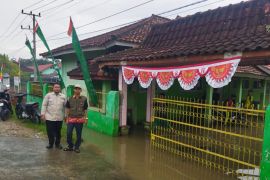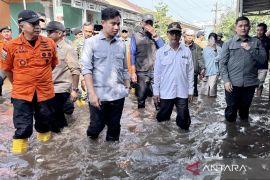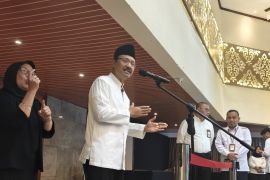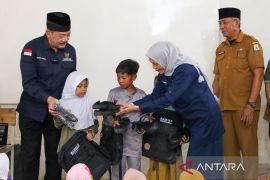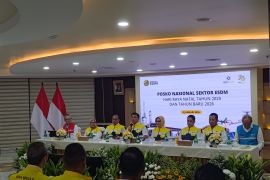In the current peak rainy season, which started in early January 2014, the floods in Jakarta have claimed 23 lives, displaced tens of thousands, and caused losses amounting to around one trillion rupiah.
Taking stock of the current grim situation, officials, experts, and NGO activists have come out with various ideas on how to prevent floods in the future.
The Jakarta administration and its neighboring districts announced various plans and projects, which are already operational or planned to be implemented, in order to deal with the inundation problem.
Jakarta Governor Joko Widodo, also known as Jokowi, recently claimed that the capital city has built 1,900 absorption wells, while around two million wells are, in fact needed, to curb flooding.
Out of 884 sewers and small rivers existing in the city, his administration has managed to clean up just 160 of them.
Jokowi stated that he also plans to return the upstream area of the Ciliwung River in Puncak, Bogor, West Java, to its natural habitat as a water catchment area to prevent flooding in Jakarta, since the floodwaters mostly arise from the Bogor District.
"The floodwaters have indeed come here (Jakarta) from the area above (the upstream area of Ciliwung river). That is what needs to be overcome. The root problem lies there," he recently noted.
The governor further explained that the citys public works office will focus on constructing river dikes, since one of the main factors that triggered the floods so far, are the weak condition of the dykes.
"Therefore, this year, the public works office will focus on constructing dikes along the river banks," he emphasized, while inspecting a dike on the banks of the Ciliwung River.
A new dike is being built on the western side of the Ciliwung River to curb floods and robs. On the occasion, Jokowi planted four trees along the Ciliwung River.
"This is a symbolic gesture to show that the river banks must be kept green and free from any human encroachment," he pointed out.
There is also a plan to construct a channel to divert the waters of the Ciliwung River to the Cisadane River, but the Tangerang administration has raised an objection, as even now the Cisadane River often overflows and inundates the Tangerang city.
Green and open spaces only account for five percent of Jakartas total area, while in line with the existing law, the city must allocate at least 30 percent. This is also one of the key contributing factors responsible for the annual flooding in Jakarta.
However, the most ambitious flood mitigation project is the construction of a giant sea wall spanning a distance of about 40kms across the north of Jakarta Bay, as a measure to keep the rising sea levels in check. This plan was charted out, as Jakarta is flooded not only due to excess rains, but also robs and tidal flooding resulting from the rising sea water inundating the land.
The plans for the development of a giant sea wall include reclaiming land for parks along the coast, waterfront housing and commercial centers, as well as a reservoir to hold one billion cubic meters of fresh water.
"We hope its construction will commence this year," Coordinating Minister for Economic Affairs Hatta Rajasa stated recently.
The planned construction of the sea wall is part of a long-term solution to resolve the flooding problem in Jakarta. The sea wall is expected to be ready by 2019-2020 and will be built by the central government in cooperation with the Jakarta administration.
Another plan to curb the flood problem is the construction of two dams in the Ciliwung upstream area, Director General of Water Resources of the Ministry of Public Works Muhammad Hasan recently revealed.
"God willing, work on the project will commence in 2015," he noted, adding that the details of the plan will soon be released and the land marked for it will be acquired immediately.
Jakarta Governor Joko Widodo, West Java Governor Ahmad Heryawan, and the officials from the Public Works Ministry recently held a meeting to discuss the plan to commence the construction of the two dams in Sukamahi and Ciawi respectively, by the year 2015.
The construction of the two dams is estimated to cost Rp1.9 trillion, which will be funded by the ministry. The Jakarta and West Java authorities will be responsible for the land acquisition in these areas.
The Ciawi dam will measure 107.3 hectares, while the Sukamahi dam will measure around 24.8 hectares. About 170 families will have to be relocated for the construction of the two dams.
The Biological Diversity (Kehati) Foundation, however, is of the viewpoint that the construction of the new dams is not enough to solve the flood problem in Jakarta and its surrounding areas.
Without positive intervention and restoration of the river basins as water catchment areas, floods will continue to recur, Kehati Director Arnold Sitompul pointed out.
River basins play a crucial role in controlling the water volume, because as catchment areas, they absorb the water flowing through their estuaries, the NGO activist noted.
For a long-term solution, the Jakarta and West Java administration must consider funding environmental projects in areas having river basins, whose rivers flow into Jakarta. Those rivers include Ciliwung, Cisadane, and Pesanggrahan, he explained.
The conversion of river basin areas into farming and residential areas along the Ciliwung, Cisadane, and Pesanggrahan rivers must be stopped and forests in the upstream areas must be restored, he added.
"The West Java provincial administration cannot single-handedly accomplish this mammoth task. Therefore, the Jakarta government must allocate funds to help restore the river basin in the upstream areas," he stated.
In fact, the Jakarta government has planned to relocate around 34 thousand families living along the bank of Ciliwung River to a modest apartment complex in South Cipinang Besar (Cipesel) to allow the river to function optimally.
"The relocation of the inhabitants living along the banks of the Ciliwung River, such as in the Kampung Pulo and Kalibata areas, which are worst-affected due to the overflowing of the Ciliwung River, will commence this year," he reported.
Jokowi claimed that the city administration will provide two low-cost apartments to accommodate the residents of Kampung Pulo in East Jakarta, who have been displaced due to the annual floods.
"Some will be relocated to the low-cost apartments in Cipinang Besar Selatan, while the others will be moved to the Komaruddin apartments in Cakung, East Jakarta," he added.
Former Vice President Jusuf Kalla, who is currently the chairman of the Indonesian Red Cross (PMI) stated that during his term, he had launched a 100-apartment project to move the residents living along the banks of the Ciliwung River as a measure to overcome the capitals flood problem. But, the previous Jakarta administration failed to follow up on the plan.
"To overcome Jakartas floods, I made the Eastern Flood Channel and added raised lanes on the airport toll road. At the same time, I proposed that Jakarta should have 100 subsidized apartment blocks so that its residents didnt have to live on the banks of the Ciliwung," noted Kalla recently.
Kalla emphasized that the people of Jakarta should switch to living in apartments to overcome the floods. He added that there were three ways to overcome the floods in Jakarta. The first option was relocating the people living on the river banks to apartments. Second, rivers should be widened, and third, more trees should be planted to increase water absorption.
Supporting Jakartas fight against flooding, the neighboring Bogor district government has set itself the target of dismantling 400 illegal villas in the Puncak resort area to restore its function as a water catchment area.
"Last year, 231 villas were torn down. We plan to dismantle another 400 villas this year," Bogor district head Rachmat Yasin remarked.
In total, 800 villas in the resort area will be dismantled, he noted.
The former site of the dismantled villas will be turned into an agro-tourism area by planting a variety of trees and developing a water catchment area to prevent the water in Puncak from flowing directly into the Ciliwung River, he pointed out.
In 2013, the Jakarta government offered an aid of Rp2.1 billion to the Bogor district to finance the demolition.
"Based on the MoU, the amount of aid totaled Rp2.1 billion last year. The amount will be doubled this year," he claimed. ***3***
(f001/INE/B003)
Reporter: Fardah
Editor: Fardah Assegaf
Copyright © ANTARA 2014

